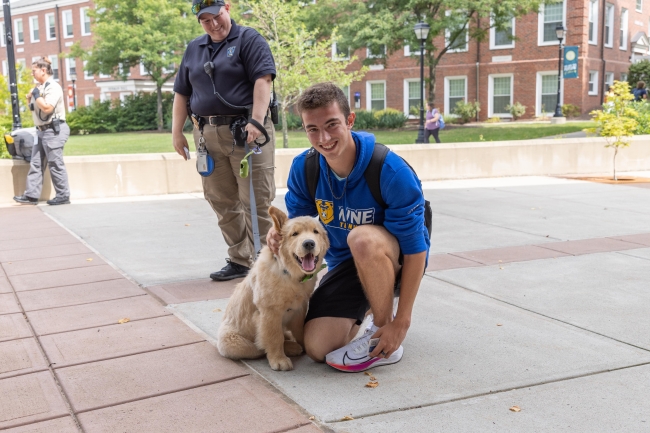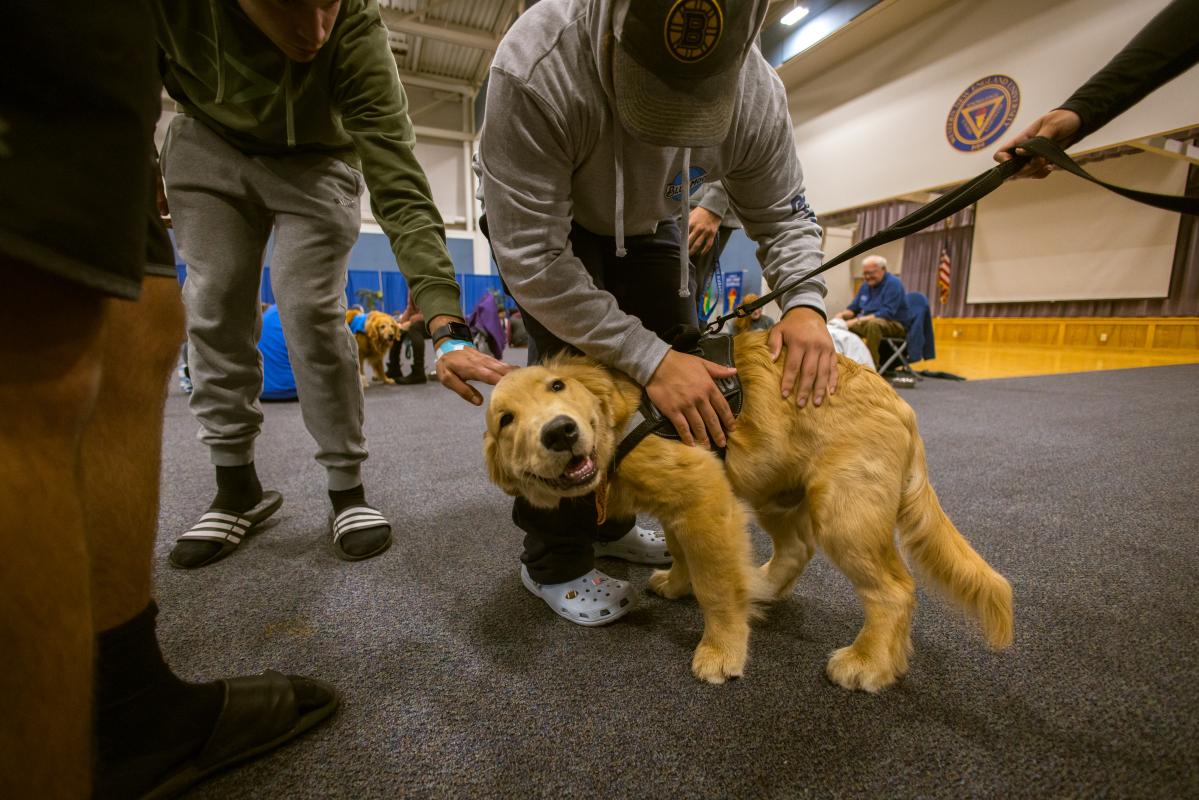You have /5 articles left.
Sign up for a free account or log in.

Bear, Western New England’s comfort dog, works alongside campus safety officers to provide stress relief and emotional support for students, faculty and staff.
Western New England University
The fluffiest member of Western New England University’s campus police force, Bear, is a 9-month-old golden retriever who loves belly rubs, ice cubes, treats and comforting students in a crisis.
While comfort dogs are not an unusual sight on college campuses, they’re most likely to make an occasional appearance, such as during stressful exam weeks. But some colleges and universities are adding comfort or therapy dogs to their workforce, providing a regular campus resource to aid in stress relief for community members and improve relationships with campus security and police.
Working and woofing: Western New England University introduced Bear to its campus community in July 2022 to provide comfort to community members in times of crisis, Mercedes Maskalik, vice president for marketing and external affairs, shares.
Bear and his handler, Sergeant Alexandria Capen-Parizo, work as first responders to campus community members in need and also make appearances at events to provide fun and stress relief to students, Maskalik says. “Students have responded well and expressed gratitude for Bear’s presence in these situations, when he is needed most.”
Bear typically works afternoon or night shifts, between 3 p.m. and 11 p.m. or 11 p.m. to 7 a.m. Beyond his day-to-day, Bear will pop up as a special invited guest at campus events.
As a higher education professional, Bear is a lifelong learner who is training to become a therapy dog, with the goal of earning certification by his second birthday in May 2024.
When he’s not on campus, Bear lives with his handler, her partner and his canine brother, Ragnar the Bernese mountain dog.

Comfort and safety: Not every student holds a positive view of its campus police force. Around one-third of students indicated they have a great deal of trust in their college’s campus safety and security staff, according to a May 2022 Student Voice survey by Inside Higher Ed and College Pulse with support from Kaplan. Around 18 percent indicated they had little to no trust in campus security staff.
By introducing comfort dogs on campus, universities hope to address negative perceptions of police and provide a positive relationship builder.
Part of a pack: Bear is one of many dogs assisting campus safety officers in creating comfort. Peer pooches include Rookie at Springfield College; Lexi at the University of Maryland, Baltimore; Elvy at Brown University; Coach at Princeton University; Cedar at Oregon State University; Gary at Endicott College; and the K-9 unit at Vanderbilt University, all four-legged officers on campus police forces.
Both UMB and Vanderbilt’s dogs come from the Brevard County Sherriff’s Office therapy dog program, Paws and Stripes College, which pairs local shelter and rescue dogs with county jail inmates, who train and care for the dogs under the supervision and direction of a professional trainer. Most Paws and Stripes canine graduates move into homes with children with disabilities or to assist veterans. Princeton’s pup is the product of Puppies Behind Bars, a similar program.
Vanderbilt University has three divisions of K-9 officers: explosive-detection canine teams, narcotic-detection canine teams and community canine teams.
The community canine teams are trained for outreach and affection rather than security and operations, helping reduce anxiety for the university’s students, faculty and staff. Vanderbilt’s community canines, Jack and Max, are certified through the Alliance of Therapy Dogs.
Does your college use animals other than canines to engage with the campus community? Tell us about it.




